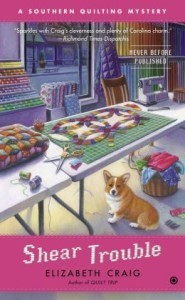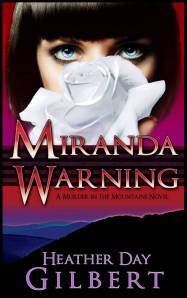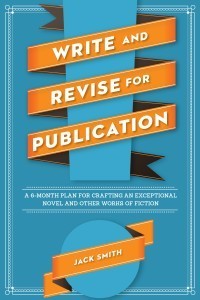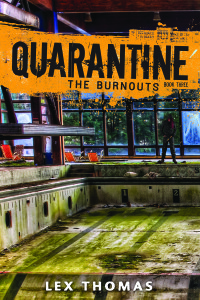Riley Adams's Blog, page 131
August 6, 2014
10 Great Things about Writing Cozy Mysteries
by Elizabeth S. Craig, @elizabethscraig
I’m frequently asked why I chose to write cozy/traditional mysteries. I’ve always just answered that it was a genre that came naturally to me–I grew up reading these types of mysteries. It’s the easiest genre for me to write.
But there are other reasons I chose the genre, too, and I explored these reasons further in a guest post for Lori’s Reading Corner today: “Top 10 Great Things about Writing Cozy Mysteries.”
I would be remiss in not mentioning that I had a release yesterday. :) Penguin’s Southern Quilting mystery #4–Shear Trouble, launched August 5th. Living up to its name, it was sheer trouble to write, but I was happy with the end result.
The post 10 Great Things about Writing Cozy Mysteries appeared first on Elizabeth Spann Craig.
August 3, 2014
Making the Leap from Historical Author to Mystery Author
by Heather Day Gilbert, @heatherdgilbert 
Many people wonder why my second book is a contemporary Appalachian mystery (Miranda Warning), when my debut novel was a Viking historical (God’s Daughter). Although both books are starts to a series, (A Murder in the Mountains and Vikings of the New World Saga, respectively), I realize there is quite a disparity between the two genres.
When I decided to publish my mystery before the second Viking novel, it flew in the face of the advice of many successful indie authors. You’re supposed to pick a genre and stick with it long enough to build a following for that series. My Viking historical was doing well and I knew readers were anxious for book two in that series.
However, I knew it would take at least a year to write/produce my next historical, and my mystery was ready to go. It had been line edited and was still out on submission with three publishers. When my agent contract came up for renewal, I realized I didn’t want to sit around waiting anymore. It was time to leave my agent, become a full-time indie author, and get my mystery out.
When I launched my mystery, I quickly found mystery readers (especially contemporary mystery readers) tend to be a different crew than historical readers. But I also found that if readers like an author’s voice, they will often follow you across genres. At this point, I think my readers are pretty evenly split between those who love my historical best and those who love my mystery best. I’m thankful for this, because it means I can pursue both series without worrying too much about losing readers.
As far as writing techniques for the two genres, mystery-writing is a whole different animal than historical-writing. My historicals take hours of research. I check into Old Norse words and try to utilize the ones they had back then. I also try to weave the storyline in with the sagas’ storylines, making a kind of cohesive whole. All this sometimes makes for slower, stop-and-go writing.
My mysteries are different. Since they are contemporary and set in my home state, West Virginia, I don’t have to spend as much time on research. I can use a wider vocabulary than I do in my historicals.
I loosely plot my mysteries based on chapters, since my chapters tend to be short scenes. I like to know which chapters will require key players to be in dangerous situations, for example. Since my mysteries are like cozies, where small-town family/friends play a key role the drama, I intersperse family action with mystery action. I want readers to feel invested in the characters themselves, a la the Karon Mitford series.
For Miranda Warning, I actually wasn’t sure whodunit until partway through the book. As I got to know the characters more, I realized who was lying and who was deceived. I love it when my characters surprise me. I don’t know if this will be the case with all my mysteries, but it just worked out with this one. Yes, I do weave in clues for my readers, and yet I like my mysteries to be more psychological than clue-based…more like Rebecca by du Maurier, where you start to unlock the key to the mystery by understanding the characters’ motivations.
People often ask me if I prefer historical writing or mystery writing. The answer often depends on my mood. I’m passionate about the Viking era, and it’s one period of history I don’t think I’ll ever get tired of reading about. And yet my contemporary mysteries are just a joy to write. I love injecting humor into my books, and it’s trickier to do with a limited vocabulary in a land where people are often fighting for survival.
The next book in my writer queue is my second (and final) Viking historical, Forest Child. When that is out (hopefully in 2015), I will be free to focus on my mystery series, which will probably continue for many books. The second in that series will be titled Trial by Twelve, and I’m looking forward to writing it.
The wonderful thing about being an indie author is that I can take chances and get my books out to readers when the books are ready, regardless of genre. Whether I’m known as a historical author or a mystery author doesn’t matter one bit to me, and that’s why I haven’t struggled too hard to brand myself. My author name is my brand. Readers will find that my writer voice is the same, no matter what century I’m writing in.
HEATHER DAY GILBERT enjoys writing stories about authentic, believable marriages. Seventeen years of marriage to her sweet Yankee husband have given her some perspective, as well as eleven years spent homeschooling. Heather regularly posts on Novel Rocket about self-publishing.
You can find Heather at her website, Heather Day Gilbert–Author, and at her Facebook Author Page, as well as Twitter, Pinterest, YouTube, and Goodreads. Her Viking novel, God’s Daughter, is an Amazon bestseller. You can find it on Amazon and Audible.com. Her Appalachian mystery, Miranda Warning, released June 20th and you can find it here.
A randomly selected commenter will receive a free copy of Heather’s new release, Miranda Warning.
The post Making the Leap from Historical Author to Mystery Author appeared first on Elizabeth Spann Craig.
August 2, 2014
Twitterific Writing Links
by Elizabeth S. Craig, @elizabethscraig
Twitterific links are fed into the Writer’s Knowledge Base search engine (developed by writer and software engineer Mike Fleming) which has over 23,000 free articles on writing related topics. It’s the search engine for writers.
Working with Unexpected Character Questions: Finding Your Character’s (or Narrator’s) Inner Story: http://ow.ly/zDjVV @writeabook
A new, free phrase thesaurus for writers: http://ow.ly/zOP6e @phrasehq
De-Stress Your Writing Life: When Life Creates Factors Beyond Your Control: http://ow.ly/zDjGd @JessBaverstock
Writing and the Creative Life: The Magic of Ambient Noise: http://ow.ly/zDjcP @gointothestory
Structuring the Novel: The Miracle Finish: http://ow.ly/zDjTA @CalebPirtle
7 Questions to Ask Before Choosing a Self-Publishing Company: http://ow.ly/zDjSb @HelenSedwick
10 Reasons Running Makes You a Better Writer http://ow.ly/zDjeE @StacyEnnis
Are authors running out of book titles? http://ow.ly/zDjXa @guardianbooks
Writing Rules: (Almost) Never Say Never: http://ow.ly/zDjLE
How Can Authors and Publishers Partner Better on Book Marketing? [Smart Set]: http://ow.ly/zO3xX @Janefriedman
5 Things Writers Should Ask Potential Agents: http://ow.ly/zDk6r @writersdigest
How to Write About Death: http://ow.ly/zDk58 @enderawiggin
The 10 Greatest Literary Parties: http://ow.ly/zDk9F @Novelicious
Bestselling ghostwriter reveals the secret world of the author for hire: http://ow.ly/zGphj @guardianbooks
29 Words That Mean Something Totally Different When You’re A Writer: http://ow.ly/zGq4C @BuzzFeed @wordsbydan
How Writing a Synopsis is Like Carving Soap: http://ow.ly/zGpVw @hollyrob1
Publishers should take advantage of their backlists: http://ow.ly/zGpQc @MikeShatzkin
Pulling the Plug http://ow.ly/zGpoI @theprosecons
Are You Building Your Writer Platform at Gunpoint? http://ow.ly/zGpxG @WriterPlatform
Improve Your Dialogue: http://ow.ly/zGpDX @jamesscottbell @thecreativepenn
Creating Dread in a Short Story Opening: http://ow.ly/zGpNS @Janice_Hardy
9 Things 1 Writer Did To Become A Full-Time Writer: http://ow.ly/zGpJO @write_practice
Self-Published Book Awards: Are They Right for You? http://ow.ly/zGq04 @MarcyKennedy
The Science of Storytelling: http://ow.ly/zGpBM @Writers_Write
6 Qualities That Make an Agent Say Yes: http://ow.ly/zGpdz @JanetKGrant
Writer Mantra: Don’t Make Assumptions: http://ow.ly/zGqdz @kcraftwriter
Useful Links for Writers: Author Voice: http://ow.ly/zGqwM @writing_ie
Imagining Beyond One’s Own Experience: http://ow.ly/zGqGu @THahnBurkett @writerunboxed
The Structure of a Short Story: http://ow.ly/zGp8N @woodwardkaren
Know Your Audience: http://ow.ly/zJhb1
Mining the Data: Genre and Gender: http://ow.ly/zJgGJ @nico1esinger
4 Tips for Writing a Short Story: http://ow.ly/zJfFa @Julie_Glover
Irony in Dialogue: Intentional Irony: http://ow.ly/zJfHp @cockeyedcaravan
Turning Your Novel into a Screenplay: http://ow.ly/zJfWd @storyfix
How to Run a Successful Book Signing: http://ow.ly/zJgL0 @MHartnerAuthor
Quality writing is not subjective: http://ow.ly/zJhjg @damiengwalter
7 Steps To Get Endorsements for Your Book: http://ow.ly/zJgUC @trainingauthors
How to Use Alliteration and Assonance: http://ow.ly/zJfSs @WritersEdit
The Philosophy of Writing and Reading: http://ow.ly/zJg4R @Shaina_Jade
How to Give your Characters a Distinctive Attitude: http://ow.ly/zJfZ0 @shalvatzis
Top 10 Character Flaws That Don’t Work For Me: http://ow.ly/zJfNA @pyrosama
Costuming Your Characters: http://ow.ly/zJhqv @mythcreants
Personality Typing Characters http://ow.ly/zJgbU @glencstrathy
4 Revision Tips: http://ow.ly/zLmmb @MichelleA_Smith
6 Things to Consider When Writing Promotional Copy for Your Book by Karl Bunker for @JFBookman : http://ow.ly/zLlQs
Noticing Filler: http://ow.ly/zLnqf @Kid_Lit
YA market opens up a new world for authors: http://ow.ly/zLnLv @latjasonsong
Michael Crichton’s Method for Plotting Out a Story: http://ow.ly/zLnAK @angelaackerman
Each character needs swoons and wounds: http://ow.ly/zLmIS
We’re losing all our Strong Female Characters to Trinity Syndrome: http://ow.ly/zLo9I @TashaRobinson @thedissolve
Douglas Preston: On Amazon, Hachette, and Indie Authors: http://ow.ly/zMLpF @Porter_Anderson @TheFutureBook
Being Kind to Our Creative Self: http://ow.ly/zDjOZ @DouglasEby
Time Management for Writers: http://ow.ly/zDjIZ @Jeannie_Moon
Identifying bloated writing: http://ow.ly/zDjZl @ACFlory
The Ironic Conclusion: http://ow.ly/zDk1V @cockeyedcaravan
155 Words to Describe an Author’s Tone: http://ow.ly/zDjHD @writers_write
Great Character: Jackie Brown: http://ow.ly/zDjbo @gointothestory
A Closer Look at the Upcoming Writer’s Digest Conference In New York Aug. 1-3: http://ow.ly/zML71 @Porter_Anderson
5 Myths About the New Era of Publishing: http://ow.ly/zDjED @leftonbomb
Acknowledgments … Who’s in Your Village? http://ow.ly/zDjB2 @mybookshepherd
The 3 things every horror author must understand: http://ow.ly/zC9pn @standoutbooks
Your characters need their potatoes: http://ow.ly/zC870 @JaneLebak
Emergency Communications Information for Writers: http://ow.ly/zC7jQ @FionaQuinnBooks @djswykert
Writer Without Residence: Keeping it Lit on the Road: http://ow.ly/zC8zE @EAyC
Making Writing Happen: http://ow.ly/zC9hX @AbstractChicken
Tips for formatting a chapter: http://ow.ly/zC7wJ
The Thing About Theme: http://ow.ly/zC89N @Frank_Zafiro
5 Short Masterpieces by the Women of Horror’s Golden Age: http://ow.ly/zC8IB @sfsignal
How to Efficiently Evoke the Setting of a Novel: http://ow.ly/zC9sS @JoeBunting
3 Myths That Hold Your Best Writing Back: http://ow.ly/zC7Gw @adderworld
Is there a role for storytelling in science? http://ow.ly/zC8oR @JonathanLWai
Law and Fiction: Googling potential jurors: http://ow.ly/zC9CO
The Hero’s Journey: Part One, the Hero & the Journey: http://ow.ly/zC9QO @AlienNextDoor
Editing Crimes: A Case Study http://ow.ly/zC7CH @kcraftwriter
How To Write A ‘Choose Your Own Adventure’ Story: http://ow.ly/zC98M @woodwardkaren
3 Reasons You Should Attend a Writers’ Conference: http://ow.ly/zC87U @losapala
A Better Way to Open Your Novel: http://ow.ly/zzQRA @storyfix
The 10 Biggest Mistakes New Authors Make: http://ow.ly/zzPVl @brooke_warner
On Trolls and Fake Bad Reviews: http://ow.ly/zzQMK @victoriastrauss
The Secret Of How to Make Your Book Un-Put-Down-able: http://ow.ly/zzQwn @kmweiland
How Authors Can Use Listmania to Promote Their Book: http://ow.ly/zzQAG @aBookPublicist
Screenwriting: Sketch Anatomy: Andy Cowan Explains the Origins of ‘Seinfeld’s ‘The Opposite’: http://ow.ly/zzQaw @splitsider
The Art of Microfiction: http://ow.ly/zzQJs @GayleTowell
How to Write a Book or Blog (The 6 Danger Stages You Need To Overcome): http://ow.ly/zA3TG @aliventures
The 3 Most Common Medical Mistakes Writers Make: http://ow.ly/zzQZc @dplylemd
7 ways to overcome fear and uncertainty about writing: http://ow.ly/zzQDy @SarahAlexis4
Murders designed to look like accidents in crime fiction: http://ow.ly/zA7hN @mkinberg
Tips for Writing a Short Film Screenplay: http://ow.ly/zzQs1 @tumbhi
What literary fiction means and why it matters: http://ow.ly/zzQiE @KOMcLaughlin
Are Your Scenes Causing an Effect? http://ow.ly/zzQ5Z @janice_hardy
Brand Yourself for Indie Success: http://ow.ly/zA6q8 @BookWorksNYC
Emotional Elements of Plot: Stories that Last Evoke Emotion: http://ow.ly/zA6C6 @plotwhisperer
Got Plot? A Handy Quick-Check – The Rhubarb Writers Group: http://ow.ly/zA6dq
Structuring a Novel Part 4: The Critical Decision: http://ow.ly/zwhBq @CalebPirtle
Why your character’s religion, or lack of it, is important: http://ow.ly/zwhxS
The Author Earnings Report Methodology: http://ow.ly/zGtlF @HughHowey @AuthorEarnings
Where are the women in African non-fiction? http://ow.ly/zwfgJ @MsAfropolitan
Edits, Editors, Editing: ”The Secret Weapon of Every Successful Writer: http://ow.ly/zGqic @RuthHarrisBooks
Javier Marias’ 7 Reasons Not to Write Novels +1 Reason Why: http://ow.ly/zwfeQ @pubperspectives
Building a Killer Email List: http://ow.ly/zwf63 @nick_stephenson
Tips For Better Dialogue: http://ow.ly/zwdP1 @Flashflood14
Why Your Story’s Ending Determines its Beginning through its Middle: http://ow.ly/zwhwt @shalvatzis
How to make a living as a writer: http://ow.ly/zwdR4 @standoutbooks
Setting: Context & Picture: http://ow.ly/zFOzw by Jack Smith.
Novel Pacing: 3 Crucial Elements: http://ow.ly/zwg26 @lindasclare
5 Things to Know about Working with Beta Readers: http://ow.ly/zwf7g @byondpapr
Tackling the Rewrite: http://ow.ly/zwfZZ @EAyC
Finding the Right Critique Group for You | Word Cafe: http://ow.ly/zwdIR
33 Things 1 Writer Learned About Writing at 33: http://ow.ly/zwfsb @LorenKleinman
Writing a Memoir: The Ultimate Selfie: http://ow.ly/zwfpe @writers_write
Tips for Finding Your Writing Groove Again: http://ow.ly/zwg7e @jawardwrites
The mistake of appealing to readers for support (in the Amazon-Hachette-indie author fracas): http://ow.ly/zDC56 @Porter_Anderson
Common Writer Advice Revised: http://ow.ly/ztlbf @HeatherJacksonW
15 Tips To Increase Your Productivity: http://ow.ly/ztkSm @mollygreene
3 TED Talks That Uncover the Secrets of Storytelling: http://ow.ly/ztktM @JulieNeumark
Free Indirect Style: what it is and how to use it: http://ow.ly/ztmGs @emma_darwin
When Defending Your Writing Becomes Defending Yourself : http://ow.ly/ztloT @salesses
8 Ways to Reignite Your Passion for Writing and Write: http://ow.ly/ztlTU @WriterJoMalby
The post Twitterific Writing Links appeared first on Elizabeth Spann Craig.
July 31, 2014
Writers—Be Careful How You Sit
by Elizabeth S. Craig, @elizabethscraig
Today I have another public service announcement for all the writers out there—sitting can be hazardous to your health.
Yes, I know. We thought we had the kinds of jobs where injuries might be limited to paper cuts or possibly dropping a laptop on our foot.
Unfortunately, I’m here to state otherwise. I’ve been in physical therapy for back issues for the last month. Occasionally I wear a hideously unstylish brace that resembles a corset in both appearance and comfort level. Anyone seeing me in the brace has asked, “Elizabeth, what happened?”
I think they’re expecting some exciting tale of adventure gone wrong (which is silly of them, if they know me at all). Snow skiing or waterskiing maybe? Perhaps some awful car accident? But I have to admit that I received my back problems from…sitting.
The doctor said it took years to get my back in the condition it’s in now…so PT is twice a week and moving a bit slowly for this impatient writer.
There were things that I shouldn’t have done that I did fairly constantly in the last ten years:
Sat on an overstuffed sofa with my feet on the coffee table and my laptop on my lap. Don’t do this.
Sat in an armchair with my feet on an ottoman and my laptop on my lap. Don’t do this, either.
Sat for long stretches, period. Yet another no-no.
This interesting graphic from Bonnie Berkowitz and Patterson Clark for the Washington Post clearly shows the health hazards of sitting and ideas for combatting the problem, including various stretches (that resemble what I’m doing in PT) and exercise balls.
Sadly, I think the way I sat was very similar to the person in the graphic. Except, of course, that my feet were up and the laptop was in my lap, not on a desk. :)
The best practice seems to be to sit with your feet on the floor and your laptop on a desk or a table of some kind. Sit with your back straight. And take frequent breaks.
Porter Anderson also wrote about the dangers of sitting in his recent post, “Don’t Take Author Obesity Sitting Down” for Writer Unboxed. We all know the myriad problems that obesity causes and sitting certainly tends to put pounds on. Fortunately, obesity isn’t my issue, but I would have done well to take Porter’s advice on standing desks in the post. I have used a standing desk off (well, it’s a standing counter, since I was writing in my kitchen) for the past couple of years but not enough for me to avoid the pickle I got myself in. In the post, Porter offers ideas for a “trial period” for using a standing desk.
RSI, repetitive strain injury, is another issue writers face. I’ve also had problems with RSI in the past and have learned to back off from typing and do some stretches when it starts flaring up. I’ve also had some success with voice recognition software (Dragon Naturally Speaking) when I’ve been on deadline at the same time I’ve had issues.
Author Roz Morris has had problems with RSI and wrote about how she deals with it in her post “RSI and when your books come back to haunt you.” She mentions posture, weight-lifting, and taking breaks as being helpful, among other things.
There is actually even software designed to force you to take writing/computer breaks (Workrave is one. Reviewed by CNET’s Dan Russell here).
Lifehack’s Anca Dumitru offers advice in her article, “How to Overcome RSI While Building Your Dream Writing Career.” In it she links to helpful hand and wrist exercises.
I’ve mentioned recently that I’m doing a good job exercising…but I was definitely not doing a good job being careful how I worked, until now. What’s your work station like for your computer time?
Image: MorgueFile: Jade
The post Writers—Be Careful How You Sit appeared first on Elizabeth Spann Craig.
July 28, 2014
Setting: Context & Picture
Guest Post by Jack Smith
When we think of a novel, we think of a story. We think of characters moving through time, growing due to conflict, coming ultimately to some sort of realization, undergoing some sort of change—maturing in some way. We think of plot. We think of theme.
We also think of setting. One thing that makes some novels memorable is a richly developed sense of setting.
A novel must have some sort of setting, or physical environs, where characters move and have their being. Two questions come up. 1.) How important is setting in a given novel? 2) How do you go about creating setting? The second question is related to the first because in some novels, if setting is not a major force, you shouldn’t do very much at all. But if setting is really important, and if it’s important to create strong visual pictures of place, you have a choice of depicting it with a few brush strokes or really describing it in vivid detail.
CONTEXT: When you think about setting, think about your character in a given context, with a particular sensibility. The South is different from the North, the West from the East. The ambiance at a factory is quite different from that of a college or university. A home in the suburbs is different from a high-rise apartment in the city.
Secondly, I would like to add, as I did in my Write and Revise for Publication,that setting can include people associated with a particular place. Your character’s workplace includes not only desks, machines of various kinds, etc., but also the co-workers who contribute to the overall atmosphere. Imagine them missing: It’s not the same place, is it?
There’s usually more than one context for a given character. And so ask yourself the following kinds of questions:
1) Which setting has primary influence on my character—home, work, a recreational spot of some kind, a place of refuge?
2) How does my character feel about the places in his or her life? Happy, annoyed, frustrated, depressed, etc? How important is place in my character’s life?
3) Does setting contribute significantly to my character’s conflicts in the story? If so, how? And how much?
DEPICTING SETTING. If a particular setting doesn’t have much to do with your character’s struggles, then give it minimal detail—just enough to establish where your character is—enough to establish the place in your reader’s mind. With places that are pretty important—plot-wise, character-wise—then, of course, you should bring them alive for your reader—in one of two ways, the first minimalist, the second maximalist: 1) by brush strokes of descriptive details interspersed with scenic treatment of characters associated with the setting, 2) by thorough descriptive detail.
–a few brush strokes with scenic treatment: Pick and choose key concrete details which are just enough to give your reader a real sense for the place. Let your reader fill in the rest. Scenes with several specific details—not necessarily concrete—can also help your reader visualize a place. With enough specific details, and a sense of lived experience through strong scenic development, the reader will fill in the rest.
–rich and numerous specific and concrete details: Furnish a full-blown picture of place. This can work quite well if it’s important to capture a number of nuances about it. But you do have to be careful not to overdo it, and you also need to create a dominant impression.
Certain places can be quite important in a novel, others less so. For places that are important, it’s important to know in what ways, and how to capture these places so that the reader can picture them, feel like they’re there, wherever there happens to be.
Jack Smith is author of the novel Hog to Hog, which won the George Garrett Fiction Prize (Texas Review Press. 2008), and is also the author of Write and Revise for Publication: A 6-Month Plan for Crafting an Exceptional Novel and Other Works of Fiction, published earlier this year by Writer’s Digest. His novel ICON will be published in June by Serving House Books.
Prize (Texas Review Press. 2008), and is also the author of Write and Revise for Publication: A 6-Month Plan for Crafting an Exceptional Novel and Other Works of Fiction, published earlier this year by Writer’s Digest. His novel ICON will be published in June by Serving House Books.
Over the years, Smith’s short stories have appeared in North American Review, Night Train, Texas Review, and Southern Review, to name a few. He has also written some 20 articles for Novel & Short Story Writer’s Market, as well as a dozen or so pieces for The Writer. He has published reviews in numerous literary journals, including Ploughshares, Georgia Review, Missouri Review, Prairie Schooner, American Review, Mid-American Review, and the Iowa Review.
The post Setting: Context & Picture appeared first on Elizabeth Spann Craig.
July 26, 2014
Twitterific Writing Links
by Elizabeth S. Craig, @elizabethscraig
Twitterific links are fed into the Writer’s Knowledge Base search engine (developed by writer and software engineer Mike Fleming) which has over 23,000 free articles on writing related topics. It’s the search engine for writers.
Clean Your Desk for Productivity (but Keep It Messy for Creativity): http://ow.ly/zpSju @99u
Name generators: http://ow.ly/zpQAb From Clever Girl Helps
Book Marketing with Videos: http://ow.ly/zpQmO @trainingauthors @KatieDavisBurps
Copyright Warnings – Hold Onto Your Rights: http://ow.ly/zpZHX @susanspann
5 Tips for Writing a Powerful Short Story: http://ow.ly/zpZMU @FaberAcademy
Horror Clichés in need of an Exorcism: http://ow.ly/zpZqt @DrewChial
An agent’s advice on tapping industry connections to find an agent: http://ow.ly/zq0eT @Janet_Reid
7 industry experts weigh in on author platforms and branding: http://ow.ly/zBk17 @Janefriedman @scratch_mag
4 Things Writers Should Know About Beta Readers: http://ow.ly/zpXHL @NatRusso
Writing an Action Scene? 5 Ways to Add More Punch to Your Novel http://ow.ly/zpXVF @hughosmith
Author Directory Sites: The Complete List: http://ow.ly/zpYIV @selfpubreview
8 Techniques To Up The Drama Factor In Your Short Stories: http://ow.ly/zpZRo @writersrelief
350 Character Traits: http://ow.ly/zpYe5 @amandaonwriting
Self-aware vs self-absorbed narration in travel writing: http://ow.ly/zpXoA @MatadorNetwork
How Not to Start a Novel: 4 Things to Avoid on Page 1: http://ow.ly/zpYoH @janice_hardy for @annerallen
5 Scene Pacing Tips: http://ow.ly/zq01s @SKouguell
Why Most Authors Should Not Have Social Media Accounts for Their Books: http://ow.ly/zpYEc @DanielDecker
Should crime authors mix fact and fiction? http://ow.ly/zpY6x @musiciany
20 Hollywoodian Clichés to Ban From Your Script: http://ow.ly/zpX6J @Mentorless
How to Write a Negative Character Arc: The Second Act: http://ow.ly/zpXZp @KMWeiland
On Writing Practice Novels: http://ow.ly/ztkN6 @ava_jae
Staying Motivated During the Tough Times: http://ow.ly/ztkTN @stdennard
7 Things To Do When You Don’t Feel Like Writing: http://ow.ly/ztmCe @writing_tips
What Entrepreneurs Can Learn From Stephen King: http://ow.ly/ztke3 @entmagazine
How to Write a Historical Fiction Young Adult Novel: http://ow.ly/ztm6X @ShanonHitchcock
Character Talent & Skills Thesaurus Entries: http://ow.ly/ztmA6 @angelaackerman
Writing Residency 101: What They Are and How to Get One: http://ow.ly/ztlvp @WindyLynnHarris
Test Your Story’s Opening Line: http://ow.ly/ztm5a @SueColetta1
Why Transmedia Storytelling Engages Young People: http://ow.ly/zpSEL @cherylrwrites
5 Conversation-Starting Questions to Ask Writers: http://ow.ly/zpSwu @StacyEnnis
4 Characteristics of Author Attitude and Why You Need Them: http://ow.ly/zpTYj @ninaamir
Structuring a Novel: The Life Changer: http://ow.ly/zpTTb @CalebPirtle
Talents and Skills Thesaurus Entry: A Way with Animals: http://ow.ly/zpPff @beccapuglisi
Fearlessness in creativity is a myth: http://ow.ly/zpSpl @jonwilkening
Sharing content more than once on social media: http://ow.ly/zpPzc @wherewriterswin
Admin Assistants in Crime Fiction: http://ow.ly/zA6LD @mkinberg
Amazon Adds Pricing Suggestions to KDP: http://ow.ly/zA49z @thDigitalReader
Making Your Home Page Stand Out: http://ow.ly/zpSPs @SusanGilbert
Comment Etiquette: http://ow.ly/zpQFH @writing_tips
5 stellar grammar sites for writers: http://ow.ly/zpPbF @junglereds
10 Common Types of Writer’s Block: http://ow.ly/zpRXB @gointothestory
5 Ways to Write Anti-Heroes Your Readers Won’t Want To Kill: http://ow.ly/zpU4y
7 Steps to Editing Like a Master: http://ow.ly/zn3SL @beccaquibbles
Describing the protagonist when you’re writing in first person: http://ow.ly/zn4eB From Clever Girl Helps
Pros and Cons of Writing in First Person: http://ow.ly/zn4Ep
How Movie Trailers Can Help You Write Better Query Letters: http://ow.ly/zn3ON @janice_hardy
On Writing Flashbacks: http://ow.ly/zn3PX @ava_jae
10 Steps To Provide a Helpful Critique: http://ow.ly/zn3HA @Shirl_Corder
Writing Strong Transitions: http://ow.ly/zn3Nw @writeabook
Queries–nudging etiquette: http://ow.ly/zn3UE @atrueblood5
26 Of The Greatest Book Dedications: http://ow.ly/zn4yk @JoBarrow
Great Character: Mr. White (“Reservoir Dogs”): http://ow.ly/zn42c @gointothestory
A Helpful Way to Determine When Not to Use “Whom”: http://ow.ly/zn3IR @CSLakin
Write What You Love and Stay True To Your Passion: http://ow.ly/zn3Ma @KALongshore
The shape-shifting factor in publishing: subscriptions: http://ow.ly/zwjjD @Porter_Anderson @TheFutureBook
Reevaluating, Reorganizing & Recommitting to Your Goals: http://ow.ly/zn3wo @KelliAnnMorgan
What does it take to create a regency romance? http://ow.ly/zn3so @EmbracingRomanc @authorJessicaJ
5 Ways to Add Conflict to Your Story: http://ow.ly/zn3Fy @mythcreants
Labor Unrest Among Amazon’s Authors: http://ow.ly/zwizG @Porter_Anderson @HughHowey @bob_mayer
New Indie Authors: What 1 Experienced Author Would Do if She Were Starting Today: http://ow.ly/zlT3L @goblinwriter
5 Reasons To Pan Those 5-Star Reviews: http://ow.ly/zweCr @drothmanwrites @Porter_Anderson
Top 10 Storytelling Cliches Writers Should Stop Using: http://ow.ly/zlT9T @robwhart
6 Ways eBooks Are Reaching More Readers: http://ow.ly/zlTly @AnnaGuastello
Adding Horror Elements to Your Writing: http://ow.ly/zlSZI
Writing the Sex Scene: http://ow.ly/zlTk3 @SusanSquires
7 Absurd Kanye West Quotes That Will Actually Help Your Writing: http://ow.ly/zlTby @rxena77
Creating A Creative Outline: http://ow.ly/zlSUO @woodwardkaren
Viewpoint is about judgment: http://ow.ly/zlSKB @AnthonyEhlers
Writing a scene: a checklist: http://ow.ly/zlSXm @johnaugust
Why and How to Schedule Your Personal Writer’s Retreat: http://ow.ly/zlTro @GretaBoris
Present Participle as Adjective: http://ow.ly/zlSJF @writing_tips
10 Tips on Writing – and Writing More: http://ow.ly/zlTfr @GarthSWright
The best literary hashtags on Twitter: http://ow.ly/zlTdr @readandbreathe @salon
The Aspiring Writer’s Dictionary http://ow.ly/zlTmJ @BillFerris @writerunboxed
Writing Revealing Dialogue: Self-centered People and Unpredictable Outcomes: http://ow.ly/zlTo4 @kiersi
How Believable Is Your Character’s Storytelling? http://ow.ly/zlT6h @skyefairwin
Why Amazon Terrifies Publishers: Let’s Look At Royalty Statements: http://ow.ly/ztkWS @GeorgeAnders @forbes
21 biggest amateur screenwriting mistakes: http://ow.ly/zkNN2 @scriptshadow
Things to Consider When Considering Self Publishing: http://ow.ly/zkOaR @srjohannes
The Boundary-Pushing Novelist Who’s Made Twitter His New Medium: http://ow.ly/ztkEN @tejucole @wired @Thessaly
Reading Through Someone Else’s Eyes : http://ow.ly/zkOfE @NewYorker
1 Writer Navigates the 1st Summer of Her MFA: http://ow.ly/zkNTj @themfayears
Why You Should Act As Your Own Author-Publisher (At Least Once): http://ow.ly/zkP4A @ChuckWendig {lang}
Concept, Structure and Transformation – How to plan a novel : http://ow.ly/zkOmU @VeronicaSicoe
The 5 Ways Every Story Should Begin: http://ow.ly/zkNrg @Jackson_D_Chase
3 anti-social skills to improve your writing: http://ow.ly/zkNKN @TED_ED
The Importance of Journaling: http://ow.ly/zkO5l @chrstnejschmdt
How to Understand Self-Publishing Acronyms: http://ow.ly/zkNG5 @booklife
Writers on Writing: “Writing What I Want”: http://ow.ly/zkOVz @LoriLitchman
How To Write A Screenplay You Can Sell : http://ow.ly/zkOO4 @goodinaroom
4 Rules for Enhanced Creativity and nailing word count: http://ow.ly/zkOkW @cairnswrites
Writing Thrillers: 50 Lessons Learned From Thrillerfest 2014: http://ow.ly/zkOiZ @thecreativepenn
Why All Writers Should Write Book Reviews: http://ow.ly/zkNZ2 @brunsdavid
First drafts: what they should and shouldn’t be: http://ow.ly/zgAzX @nownovel
How To Market Your New Book http://ow.ly/zgvVO @brettarends @forbes
Ray Bradbury on Failure, Why We Hate Work, and the Importance of Love in Creative Endeavors: http://ow.ly/zgwEK @brainpicker
Don’t Take Author Obesity Sitting Down: http://ow.ly/zqkkf @Porter_Anderson @writerunboxed
8 Story Fixes: http://ow.ly/zgA5N @JaredMGordon
Hiring a Book Publicist 101: http://ow.ly/zgCfq @suegreenbergpr
20 Screenwriting Tricks And Tropes We Never Need To See Again: http://ow.ly/zgyBt @io9
Why 1 Writer Left Her Agent & New York Publisher: http://ow.ly/zpYPn @ClaireCookwrite for @JaneFriedman
Writing: One Size Does Not Fit All: http://ow.ly/zgw8l @writing_tips
Navigating the Book Promotion Jungle: http://ow.ly/zgzGQ @WriterlyTweets
7 Pieces of Life Changing Writing Advice From Dear Sugar: http://ow.ly/zgwLE @RyanHoliday @thoughtcatalog
Digital Revolution Act 2: TheTrue Nature of Amazon Revealed? http://ow.ly/zpiOX @claudenougat
Why write flash fiction? http://ow.ly/zgzSz @LenKuntz
Patience Is a Writer’s Most Important Virtue: http://ow.ly/zgw3X @writeitsideways
An agent’s advice on when new writers should start attending conferences: http://ow.ly/zgwTA @Janet_Reid
Integrating Writing Into Life: http://ow.ly/zoyH5 @LexThomasAuthor
Writing by hand, or typing: when are you most creative? http://ow.ly/zgwgr @chrisrobley
Words to avoid when writing jacket copy: http://ow.ly/zgwxB @markkrotov
Practice, Persistence, Professionalism: http://ow.ly/zgsHc @nancyjcohen
Is Your Book Cover Design Stopping You From Being On The Bestseller List? http://ow.ly/zgvsg @ThomasEMcGee
Malapropisms, Spoonerisms and Oxymorons: http://ow.ly/zgfg6 @CASpeight
How to Survive Slow Book Sales: http://ow.ly/zgfnG @shalvatzis
Being the Person Your Writing Needs You to Be: http://ow.ly/zgfBb @LeonardoTrait
Who Said What? Speech Tags Decoded: http://ow.ly/zgfxM @HGComan
Why Your Book Deal Is Just the First Step: http://ow.ly/zgfIa @LizandLisa @writerunboxed
Food Idioms Can Fuel Our Writing Career: http://ow.ly/zgePM @pubcoach
How much time should writers spend blogging and building websites? http://ow.ly/zgeu1 @roz_morris
Essential Dos and Don’ts for Author-Bloggers: http://ow.ly/zgfko @annerallen
The post Twitterific Writing Links appeared first on Elizabeth Spann Craig.
July 24, 2014
Resources for Writers—Industry News
By Elizabeth S. Craig, @elizabethscraig
I’ll be the first to admit that reading industry news can be…stressful. I’m one of those people who avoids confrontation at all costs, so I rarely weigh in, although I follow trends and news very closely. I form opinions and those opinions evolve as circumstances evolve.
But it’s vital that we keep abreast of developments. News stories help us make smart decisions with our career paths and contracts. So I thought I’d provide some reputable sources here for news and information. Some of these sites frequently display bias toward self-published/indie authors and some are most-often biased toward traditional publishers. I read them all. I remember studying abroad in London during college and being told I should read The Times, The Independent, and The Guardian to get a balanced view of my own. So I’m following in that tradition.
First off, journalist Porter Anderson’s site. If you don’t have time to follow various sites but want to keep up with industry news…he pulls everything together for you in his reports. He curates news and does a nice job bringing different viewpoints together in each of his posts. Porter writes for different sites, so it’s probably best to follow his site’s RSS feed so you can keep up with him. Or, if you’re on Twitter, just follow him there to receive the most current information—and to also pick up his live feeds from the different conferences he covers.
If you’re looking for breaking industry news, reporter Laura Hazard Owen at Gigaom does a nice job keeping writers current. Her stories can be found here.
Jane Friedman’s weekly feature, “The Smart Set,” is excellent for sharing excerpts of well-written posts on current hot topics and raising questions culled from the content.
Attorney David Vandagriff ‘s Passive Voice Blog serves as an aggregator of industry news and industry discussion. Reading the comments is a must.
Hugh Howey is doing an amazing job speaking on behalf of self-published writers and appears to be on the verge of sparking what Porter Anderson termed a labor movement. He always has something interesting and thoughtful to say.
Joe Konrath’s posts can get heated, but his thoughts on problems inherent with traditional publishing frequently fascinate me.
David Gaughran’s blog reports on industry upheaval but also helps writers wade through tough issues and helps provide guidance on areas writers might be debating (should we go on Wattpad? Should we try KDP? What does the breaking news from Amazon mean for me?). He’s also done some nice reporting on publishing scams.
Digital Book World reports industry news and holds a yearly conference for publishers and other content providers on adapting to the digital landscape.
Mike Shatzkin’s blog, The Shatzkin Files, offers in-depth analysis of publishing-related issues from an industry perspective. (Mike Shatzkin has spent nearly fifty years in the business in many different roles.)
So…if you want to keep up with industry news, there are plenty of options. What are some of your favorite sites? Read any of these?
Image: MorgueFile: Alvimann
The post Resources for Writers—Industry News appeared first on Elizabeth Spann Craig.
July 20, 2014
Integrating Writing Into Life
by Lex Thomas, @LexThomasAuthor
We all have our demons. Mine is writing. It’s been with me since I was little, this  compulsion to create. A nagging feeling like I shouldn’t be living in this moment, I should be recording it. When life is calling, when reality is demanding my attention, that urge to write it down can be a horrible feeling. I feel as though I’m being pulled in two, because an idea requires so much thought and time and energy to become realized. As much as I feel a responsibility to my waking life, to my loved ones, to the care of my home and body, to my simple day to day enjoyment, I also feel a responsibility to this story I’ve conjured in your head. And by no means is exorcising it an easy process. Writing takes time. It’s not instantaneous. It’s a process. A story becomes worth reading in stages, each one as lengthy as the one before it.
compulsion to create. A nagging feeling like I shouldn’t be living in this moment, I should be recording it. When life is calling, when reality is demanding my attention, that urge to write it down can be a horrible feeling. I feel as though I’m being pulled in two, because an idea requires so much thought and time and energy to become realized. As much as I feel a responsibility to my waking life, to my loved ones, to the care of my home and body, to my simple day to day enjoyment, I also feel a responsibility to this story I’ve conjured in your head. And by no means is exorcising it an easy process. Writing takes time. It’s not instantaneous. It’s a process. A story becomes worth reading in stages, each one as lengthy as the one before it.
So the question becomes: how do I manage this responsibility of writing when it doesn’t feel like it fits neatly into the rest of my life? Figuring out how to manage writing has been as much of a journey as the craft of it. There are those impossible maniacs who seem to be able to write anywhere, anytime, picking up and putting down their narrative at the drop of a hat, writing on napkins, in their phones, on walls. I’ve never been that way. I’ll do that when I’m brainstorming, but as far as the actual composing of words goes, the drafting, I’m the worst kind of writer. I lost most of ability to hand-write around 2002. Now, I can’t write without a computer. It also takes me a good 45 minutes to get in the zone and another 45 minutes to get out of that creative headspace and become sane again. I can’t write at night. I’m just not wired that way. My best hours are old-fashioned: 9 to 5. You know, those hours when most employers expect you to work.
I’ve been in every type of working scenario, and let me tell you the best one is no straight job at all. I’ve never been so functional and prolific as a writer as when I could keep that 9 to 5 schedule, 5 to 6 days a week, but that’s a luxury, rather than the norm. The world is expensive, and writing rarely pays. When you’re under contract and the check’s in the bank, you write like the wind. Because you know that it’s only a matter of time before the world comes knocking. But what happens when you’re writing on spec, and the bills need paying, your children need their dad, and your wife needs her husband? You have to be there for them.
So, after all my yammering and qualifying, what am I saying? Schedules change. And fighting your life, feeling torn in two directions, fueling a building frustration that life is standing in the way of your writing doesn’t help your life or your writing. It makes you sour. The key is to find balance. Openness, seeing your life and your writing as symbiotic will help you find a more natural process. When life is hectic, and I find myself needing to write for hire, I’ve had to adapt. My word processor of choice is Scrivener, now more than ever, because of the Project Targets feature. It allows me to create my own deadline and figures out the word count I need to hit with every session to stay on target. If your time is limited, knowing that you only need to knock out 700 words helps you buckle down when you think, “oh god, I couldn’t possibly write right now.” When I’m not near my computer, I can use Google Drive on my phone, and access a live document. It helps me feel like my writing isn’t a compartmentalized experience. It’s not ideal, but it keeps me moving forward.
All that said, when you find those moments when the world doesn’t need you, steal them.
Lex Thomas is the pen name used by the screenwriting team of Lex Hrabe and Thomas Voorhies.
and Thomas Voorhies.
Lex Hrabe was a Drama Geek in high school as well as student body president. L
ex received a BA in Drama and English from the University of Virginia and has worn hats as an actor, director, and writer. In addition to working as a screenwriter, he heads development at Cinespire Entertainment, a boutique production company.
If Thomas Voorhies were a character in the Quarantine trilogy, he would be a member of the Art Geek gang. Thomas graduated with a BFA from the Rhode Island School of Design and continues to practice and exhibit his realist oil paintings. To see a selection of his artwork, visitwww.thomasvoorhies.com.
Lex Hrabe lives in Virginia; Tom Voorhies lives in California.
The post Integrating Writing Into Life appeared first on Elizabeth Spann Craig.
July 19, 2014
Twitterific Writing Links
by Elizabeth S. Craig, @elizabethscraig
Twitterific links are fed into the Writer’s Knowledge Base search engine (developed by writer and software engineer Mike Fleming) which has over 23,000 free articles on writing related topics. It’s the search engine for writers.
Create a Compelling Character, Addendum: His or Her Unique Perspective: http://ow.ly/z9jTA @CockeyedCaravan
Authors Will Soon Be Able to Sell their eBooks on Facebook: http://ow.ly/zkGvj @Goodereader
Where To Set Your Story and Tips for Researching Locations: http://ow.ly/zlTFh @LovelyAuthor
How can we ease the summer’s debate? http://ow.ly/zkRCm @Porter_Anderson @HughHowey @philipdsjones
How to Start Your Story: http://ow.ly/zc9vQ @HGComan
3 Steps to Taking Your Character Further and Deeper With Anger: http://ow.ly/zc9yr @angelaackerman
Should you revise, rework or reject your book? http://ow.ly/ @emma_darwin
12 Hashtags for Promoting Your Book: http://ow.ly/zca8k @ReadersJournal
4 Ways To Write Every Day: http://ow.ly/zcadP @woodwardkaren
Choosing and Staying True to A Point of View: http://ow.ly/zcbhZ @amyjmcelroy
Creating a Scene Outline for Your Novel: http://ow.ly/zcbVu @JodieRennerEd
Always Open To The Possibility Of Writing: http://ow.ly/zcah8 @jrobertlennon
100 Writing Prompts: http://ow.ly/zcapg @Wiseink
Pricing Strategies for Ebooks in a Series: http://ow.ly/zcbOz @goblinwriter
Why children’s literary heroes need to be less white: http://ow.ly/zcaTe @amymcculloch
26 Ways Writers Can Make a Workshop Successful: http://ow.ly/zcbdS @themjkelley
Write an irresistible book blurb in 5 easy steps: http://ow.ly/zcavb @writers_write
In Defence of Ghostwriting: http://ow.ly/zcb5B @GMcDuling
How Authors Can (and Should) Use Author Copies: http://ow.ly/zc9br @outskirtspress
20 Ideas for Sharing on Social Media: http://ow.ly/zgfuO @CaballoFrances
11 Author Quotations to Help Reluctant Readers Find Their Way: http://ow.ly/zgeAH @geekerydo
Friendships Among Your Characters: http://ow.ly/zgfqp @CantrellJason
You’re not behind and writers are not in a race: http://ow.ly/zgeJc @deanwesleysmith
Successful Querying: ItÂ’s Not All About The Letter: http://ow.ly/zgfSD @mmfinck @womenwriters
When Real Life Happens To Your Fiction: http://ow.ly/zgeZ5 @chgriffinauthor
Freelancing: Make a Living as a Writer: A Simple Strategy That Works: http://ow.ly/zgemq @hopeclark
9 Things Writers Need to Know Before the Book Deal: http://ow.ly/zkO8C @MartinaABoone
The Arc of The Indie Author Journey: From First Book to CEO Of Your Global Media Empire: http://ow.ly/z9icl @thecreativepenn
July 2014 Author Earnings Report: http://ow.ly/zkGEI @AuthorEarnings @HughHowey
How to Write a Negative Character Arc: The First Act: http://ow.ly/z9jc4 @KMWeiland
Do Writers Practice Their Art? http://ow.ly/z9j84 @janice_hardy
History’s Most Heinous Typos: http://ow.ly/z9juZ @drummondmoir
How to Live the Brave Story You Must Write: http://ow.ly/z9izU @JeffreyDavis108
3 Ways to Brand Your Covers: http://ow.ly/z9iTG @janetkgrant
What to blog about: 5 top tips for new and aspiring authors: http://ow.ly/z9iY2 @altait
Never let research get in the way of a good story: http://ow.ly/z9ijN @IrishTimes
7 Questions that Will Change How You Publish: http://ow.ly/z9iPD @cjlyonswriter
Situations in crime fiction when characters are faced with difficult choices: http://ow.ly/zja2R @mkinberg
7 Things Writers Can Learn from Stand-up Comedians: http://ow.ly/z9jhE @byagoda
How To Begin Your Book With A Knockout: http://ow.ly/z9j23 @huffpost
Enjoy what you’re writing or you’ll never finish: http://ow.ly/z9iox @Eliz_Mallory
One Thing Authors Shouldn’t Leave Out of A Story’s “Big Moment”: http://ow.ly/z9j5R @vgrefer
Even Harvard Business School advice may not work for publishers in their struggle with Amazon: http://ow.ly/zgrBH @MikeShatzkin
How To Change the Future of Publishing Now, Even Though It’s Too Late: http://ow.ly/zgvkn @vaporbook
5 Things Every Screenwriter Should Know About Writing A Novel: http://ow.ly/z6F9G @Abdaddy
Stereotypes, Tropes, and Archetypes: http://ow.ly/z6ET1 from Clever Girl Helps
A Crash Course in Mystery Sub-Genres: http://ow.ly/z6ENF @MarcyKennedy
A digital renaissance for the science fiction short story: http://ow.ly/z6EY3 @damiengwalter
Preparing for Success (and finding more time to write): http://ow.ly/ @DanBlank
5 Signs Your Character Is Fully Developed: http://ow.ly/z6GbN @mythcreants
Mystery Novelist Daniel Friedman on Amazon v. Hachette: http://ow.ly/zgDvv @junglereds @DanFriedman81
Songwriting Tip: Rhyming http://ow.ly/z6EM9 @harrietschock
Uses of the Past Participle: http://ow.ly/z6ES4 @writing_tips
Character Checklist: http://ow.ly/zgBQF @MartinaABoone
Putting An End To Plot Conveniences: http://ow.ly/z6F5b @litreactor
Why characters are the heart of your novel – & how you can write them effectively: http://ow.ly/z6FgI @roz_morris
How to Get Successfully Published Today: Big 5, Indy, or Self-Publish? http://ow.ly/z6F6S @passivevoiceblg
Submit Queries Using Real Name or Pen Name? http://ow.ly/z6FWG
$5k advances for lifetime rights of works that can’t go out of print is indefensible: http://ow.ly/zguS2 @HughHowey
What Is the Future of the Physical Bookstore? [Smart Set] http://ow.ly/zgrwe @Janefriedman
Writer Nightmares: http://ow.ly/z6FfR @rebeccamakkai
Sentence clauses and commas. http://ow.ly/z6EUN @ericjbaker1
5 Free Tools of Social Media Success for Writers: http://ow.ly/z6G95 @SMisDynamite
How to fix a plot hole: http://ow.ly/z6Fc8 @roz_morris
How character POV affects word choice: http://ow.ly/z4W6h @weifarer
3 Quotes every Writer should Ink to their Souls: http://ow.ly/z4VWH @EudaimoniaJanne
If Writers Wrote as Some People Talk: http://ow.ly/z4WmJ @Massim0Marin0
Common Plotting Faults and What to do About Them: http://ow.ly/z4Uq4 @barbbradley
6 Things That Will Happen a Few Days Before Your Book Comes Out: http://ow.ly/z4VdK @Petermball
Handling eBook Pirates http://ow.ly/z4VTN @BadRedheadMedia @macpetreshock
For Writers, Are Bars the New Coffee Shop? http://ow.ly/z4Ws0 @UrbanMuseWriter @contently
Here’s why you shouldn’t underestimate the power of setting: http://ow.ly/z4WLD @standoutbooks
Take Your Characters Out to Lunch: 5 Development Exercises: http://ow.ly/z4VPe @adearinthewoods
8 Reasons All Authors Need Business Plans for Their Books: http://ow.ly/z4VIX @ninaamir
How to Personalize Your Revision Checklist: http://ow.ly/z4Wjj @writing_tips
Finding an Agent: What No One Wants to Talk About: http://ow.ly/z4V2p @arnabontemps
Battling Cliches & Tired, Old Tropes: Hate-at-First-Sight Love Stories: http://ow.ly/z4Xda @stdennard
Harper Lee gave the US a story for the ages. Just don’t ask her about it: http://ow.ly/z4W8J @CharlesLeerhsen @SmithsonianMag
How To Maintain Your Writing Voice: http://ow.ly/z4Vn8 @SITSGirls
What does #Steampunk Mean? 10 Authors Share their Vision of the Genre: http://ow.ly/z4WE3 @Fuelforwriters
6 Things Your Book Publicist Won’t Tell You: http://ow.ly/z3RJ2 @SarahPinneo
Writing with Emotion: http://ow.ly/z3Oxa @JanalynVoigt
Having Trouble Plotting Forward? Try Plotting Backward: http://ow.ly/z3Phq @Janice_Hardy
How NOT to write disabled people: http://ow.ly/z3OV7 @disabilityinlit
The Daily Routines Of 26 Of History’s Most Creative Minds: http://ow.ly/z3JPv @FastCoDesign
Standalone or series? http://ow.ly/z3RTk @Author_DFarland
An agent on agent guidelines and querying: http://ow.ly/z3KqS @Janet_Reid
Script To Screen: “Cinema Paradiso”: http://ow.ly/z3RQV @gointothestory
#FutureChat recap: How can we pay authors what they deserve? http://ow.ly/zbu56 @Porter_Anderson @MirabilisDave @camillelaguire
What Should an Author Expect from an Agent? http://ow.ly/z3JHC @susanspann
5 Top Tips To Boost Writing Productivity | Self-Publishing Advice http://ow.ly/z3JBf @CSheehanMiles
On Writing the First Kiss: http://ow.ly/z3KHi @AnnaCampbelloz
What Is Voice In Fiction? http://ow.ly/z3KAR @MartinaABoone
Query question: how much less enticing is a second novel? http://ow.ly/z3OE4 @Janet_Reid
So You Want To Make A Living Writing? 13 Great Truths: http://ow.ly/z3L1g @bob_mayer
20 Ways To Reuse, Recycle and Repurpose Content: http://ow.ly/z3JsP @bookgal
10 things most writers don’t know about the woods: http://ow.ly/z3Rqm @DanKoboldt
What 1 writer learned while reading for an agent: http://ow.ly/z0qf9 @OrlyKonigLopez
Continue writing a successful series? Or take time out for something new? http://ow.ly/z8DWP
5 Essential Questions to Ask When Writing Your Protagonist: http://ow.ly/z0oet @bridgetmcnulty
How to Respond to Alarming Industry Changes: http://ow.ly/z0ozO @rachellegardner
4 Reasons We Sometimes Write (Too) Slowly: http://ow.ly/z0pKP @vgrefer
Will Publishing Change The Tone as Rhetoric on Both Sides Heats Up? http://ow.ly/z9cIZ @thoughtcatalog @Porter_Anderson
Why We Need ‘Ugly’ Heroines: http://ow.ly/z0p3t @buzzfeed
Dinner parties featured in crime fiction: http://ow.ly/z8u5k @mkinberg
The Author-Reader Amazon Revolution:Mirage or Reality? http://ow.ly/z0opa @claudenougat
10 Tips to Beat Writer’s Block: http://ow.ly/z0pk0 @sdwriter
6 Writing Tips From John Steinbeck: http://ow.ly/z0o65 @verbicide
The 8 laws of Foreshadowing: http://ow.ly/z0ppn @nownovel
9 Great Tools and Programs to Help You Edit: http://ow.ly/z8oyF @alexjcavanaugh
The Art of the Opening Sentence: http://ow.ly/z0nPq @jrc2666
Recharge Your Writing Batteries: http://ow.ly/yX1It @CarolineLawrenc
When a Writing Dead End Becomes a Detour to Success: http://ow.ly/yWUA6 @NinaBadzin
Magical Creatures for Magical Worlds: Fairies http://ow.ly/yWUvo @Chilari
Point of view shifts and head-hopping: always bad? http://ow.ly/yWUqT @roz_morris
Hidden Emotions: How To Tell Readers What Characters Don’t Want To Show: http://ow.ly/z0p7O @angelaackerman
What Defines Traditional Publishing? What You Don’t Know CAN Hurt You. http://ow.ly/z6HxJ @annerallen
The 7 Paragraph Synopsis: http://ow.ly/yWTfw @HopeRamsay
3 Ways to Plan a Marketable Novel without Losing Creativity: http://ow.ly/yWSHK @ninaamir
Dissecting Your Characters: http://ow.ly/yWRqg @TerriLAustin
Positive Versus Negative Description: http://ow.ly/yWTpV @Kid_Lit
3 Ways to Train Your Brain to be More Creative http://ow.ly/yWSVP @AlexZamorski @thewritelife
A normal life for our characters? http://ow.ly/yWRv0 @VickyThinks
Writing Workshops: Tough Love, Indulgence, or Shark Tanks? http://ow.ly/yWRA8 @BTMargins
Why Words Matter in Fiction and Story: http://ow.ly/yWUol @noveleditor
How to Create a Compelling Character: The Moment of Humanity http://ow.ly/z9jGa @CockeyedCaravan
The post Twitterific Writing Links appeared first on Elizabeth Spann Craig.
July 17, 2014
Resources for Writers: Protecting Ourselves
By Elizabeth S. Craig, @elizabethscraig
Unfortunately, protecting ourselves against scams is a very important topic for writers. And I think that, sadly, we’re easy prey since we’re eager to publish and want so much for our story.
Today, I’m sharing resources that help us avoid bad contracts, publishing scams, shady agents, etc.
First of all, Preditors and Editors (the unusual spelling is intended). This site maintains lists of recommended (or “not recommended”) agents, publishers, contests and more. If you worry you’re potentially being scammed or wonder if the agent you’re considering is reputable, this should be your first stop.
Writer Beware is another important resource that updates writers on current scams that writer Victoria Strauss has uncovered. The blog’s mission statement: “Shining a bright light into the dark corners of the shadow-world of literary scams, schemes, and pitfalls. Also providing advice for writers, industry news and commentary, and a special focus on the weird and wacky things that happen at the fringes of the publishing world.”
If you are in the position of having to negotiate your own contract, there are resources available to help you know what to be on the lookout for. I wrote a post in 2010 that covered as many available resources as I was able to find at the time. Most helpful, I think, was the Agenting 101 series of posts, put together by agent Kristin Nelson, now Hugh Howey’s agent. Part one of the series is here and you can find the rest of the series in her right sidebar. I used this series to negotiate my first contract with Midnight Ink before I was agented.
Because these posts are a bit dated, I also want to share the link to Passive Voice Blog where lawyer David Vandagriff will caution you about non-compete clauses (which have no business in our contracts).
Keeping it Legal is a blog by self-published writer and lawyer Helen Sedwick . She has helpful posts on a variety of legal topics for writers, including “10 Legal Terms Every Writer Should Know.”
Susan Spann’s blog: Susan Spann (no relation to me) is also a lawyer and writer and frequently posts on contracts and other legal issues concerning lawyers. Her publishing law posts are particularly helpful.
Protecting ourselves may also mean protecting ourselves from lawsuits. Industry expert Jane Friedman has two important posts that I think every author should read: “When Do You Need to Secure Permissions?” and (this one a guest post by attorney Bradlee Frazer) “Is It Fair Use? 7 Questions to Ask Before Using Copyrighted Material.” I’ve read these posts numerous times.
Also on Jane Friedman’s site is a helpful post from lawyer Helen Sedwick, this time on the topic of taxes: “What Every Self-Published Author Needs to Know About Taxes.” This article covers protecting ourselves from a nasty surprise around tax time (and I’ve had them before, unfortunately).
These are my go-to sites for educating myself on various problems I could face as an author. Do you have any sites to add or info to offer?
Image: MorgueFile: Alvimann
The post Resources for Writers: Protecting Ourselves appeared first on Elizabeth Spann Craig.




